IN-DEPTH / IN-DEPTH
Increasing number of young Chinese advocate buying less and saving more, upon reflection of consumerism and material desire
Staving goods anxiety

High-volume goods during the Double 11 shopping festival in Hohhot, capital city of the Inner Mongolia Autonomous Region Photo: IC
Unlike millions, Fan Jiahui had nothing to do with this year's Double 11 shopping festival. The 23-year-old only bought some sanitary pads during this biggest online sales event, and that was because she had happened to run out of ones bought earlier. She paid no attention to the dazzling discounts and sales promotions that existed everywhere.
Despite that the Black Friday-like Double 11 shopping festival is still one of the world's most eye-catching shopping sprees with a huge amount of trade volume, its growth, however, has become slower. This year, Alibaba's platform T-mall said its total volume of transactions was 540.3 billion yuan ($84 billion), up from last year's 498.2 billion yuan. The volume grew 8.5 percent compared with the previous year, the slowest growth since the festival started in 2009.
Fan looks extremely calm in the face of this shopping craze, especially when numerous Chinese consumers can't help but emptying their wallets to advertising slogans like "Cheap! Buy, buy, buy!"
"I never buy anything that I don't need," Fan told the Global Times. "I can resist the lure [of consumerism]."
Including Fan, a growing group of Chinese youth is coming under the spotlight for advocating for buying less, saving more, frugality, and a minimalist lifestyle. The fast expanding group call themselves "consumerism opponents," meaning those who keep a clear head in the face of a barrage of advertising and remain vigilant against consumerism and material desires.
Rational thinking, sense of crisis
A controversial case of "consumerism opponent" is that of a 32-year-old woman who reportedly bought two flats on mortgage in Nanjing, capital of East China's Jiangsu Province, through frugality or even stinginess. The woman told media that she wears used clothes sent by her friends, only takes public transport, and uses as many free coupons as she can find in buying daily necessities.
This is an extreme, isolated case, and most "consumerism opponents" in daily life said they don't reject the purchase of necessities in moderation. They're wearier of sellers' various tricks, such as discounts and buy-one-get-one-free gimmicks, or their compelling sales pitches like "how much the product can bring you," they told the Global Times.
Fan is tired of these tricks. The Double 11 sales, for instance, is "troublesome and a headache" to her, as buyers have to do a lot of calculations and try hard to get coupons for a cheaper price.
"Sometimes it's not really cheaper," Fan said, mentioning a feeding-bottle a friend of hers bought at great effort at about 530 yuan ($83) during Double 11. "That was 50 yuan higher than the same feeding-bottle I had previously bought as a gift for my nephew."
Fan doesn't like dolls, blind-box toys, and decorations that many of her peers usually buy. "I don't understand why they buy these," she said. "They are of no use."
Similar to Fan, 30-year-old Li Xiang, former media staff, also never buys anything he thinks is unnecessary. Living in one of China's most expensive cities, Beijing, though, Li only spends 200 yuan ($31) on shopping each month, "mainly for clothes and books," he said.
Li said he has a very low desire for material things, as spending can't bring him gratification. "And when making a move, it is tiring to pack up many things," he told the Global Times.
Spending also adds to Li's worries about his life in the future. Quitting his last job of 10,000-yuan monthly pay, now Li has no regular income, and he's not sure whether his next job can offer him more.
"Actually many people's regular income is not that regular," he added. "For most employees, their jobs can easily be replaced by someone else."
A recent survey showed China's young generation aged between 18 and 34 prefers to save money than ever before. The average monthly saving amounts of this group is 1,624 yuan ($254) this year, the highest since 2018, according to the survey report released by Fidelity International in October.
The rising saving rate reflects the heightened sense of crisis among young Chinese people, especially after the COVID-19 pandemic broke out, observers said.
Saving money is to deal with future uncertainties, such as the potential spending on housing, healthcare, education, and emergencies, said Yin Zhichao, dean of School of Finance at Beijing-based Capital University of Economics and Business. "Generally speaking, Chinese families still face high levels of uncertainty, and so the saving rate remains high," Yin told the Global Times.
Li believes that no matter whether there is a pandemic or not, the risk of instability always exists. To Li, spending less and saving more gives him more sense of security. "It's to be prepared for danger in times of safety," he said.

Photo: VCG
Fast-expanding group
"Let us do it: Don't follow the trend blindly. Don't be held hostage by consumerism. Just become the opponents of the consumerist market!"
This is the group profile of the popular "Don't buy! Consumerism opponents" discussion group, created at the end of October 2020 on Chinese media review platform Douban. The group attracted more than 100,000 members in just three months, and now has a membership of over 300,000.
The discussion group has a "Don't buy" column, where members post examples of their unpleasant shopping experiences to help other group members avoid their missteps and save money, and save themselves from worry. And in the discussion forum, many members share some observations with each other on merchant consumer traps and how to rationally identify their shopping needs to reduce impulsive spending.
"I started this group with the intention of going against the trend before the Double 11 sales, to tell people what not to buy," said Suisuitie (screen name), the creator of the "Don't buy! Consumerism opponents" group, a post-1990s generation woman and internet industry employee in Shenzhen, South China's Guangdong Province.
Today, the marketplace is ubiquitous with merchandising, from live streaming to buyers online recommending deals by whipping up a frenzy of anxiety and a fear of being left out, Suisuitie told the Global Times.
"But we are also pleased to see that more and more people are aware of and wary of consumerism, and there are many platforms on the internet where they can gather and communicate," she noted.
According to Suisuitie's observation, among the current large group of consumerism opponents, some people are advocating for frugality, preferring to spend less or buy affordable alternatives to costly products, or try to curb their consumerist desire, and others hope they don't become seduced by the merchant's sugar-coated lies and resist the temptation of overconsumption.
Suisuitie said she respects different views on consumption, but what she and her "groupmates" value more is the consciousness and ability to sort out their own needs without impulsive spending, and buy what they really need.
"Consumerism creates endless anxiety and a desire for consumers, using marketing techniques to make people feel that you need something that you don't. For example, the slogans continue to tell us that a sophisticated girl must have many tubes of lipstick and several bags. But actually, you should ask yourself whether you need these things or not," she said.

Photo: IC
Back to values
In China, the consumerism opponents have garnered wide attention and praise for their rational consumption habits. Instead of simply saying no to consumption, they advocate for sensible consumerism, trying to encourage people to follow their actual needs, and to reflect on, and examine their shopping behaviors, the People's Daily commented earlier this month.
"It shows the maturity and rationality of some young people's consumption concept today," it said.
Being a consumerism opponent does not mean that we resist any consumption or completely suppress our desire to consume and there is no need to censure ourselves after impulse shopping, Suisuitie said. "Instead, we can analyze our purchase motivation and the utilization of different goods more rationally and calmly, and try to make those 'lucid decisions' more frequent in our daily life," she said.
"Necessity in life" and "cost efficiency" are the two factors weighed against by young consumers when considering a shopping spree, said a survey on youths' consumption behavior conducted by CBNData in June, in which nearly 70 percent of the respondents were millennial and Generation Z. About 70 percent of the young consumers conduct research before making a purchase, the survey report said.
It shows a growing trend among young Chinese individuals, that is, "they want to return to the value of the goods or services," said the report.
Speaking of the "consumerism opponents," they represent the consumption preference of some young Chinese, although they currently have a limited impact on China's hundreds of millions of consumers as a whole, Yin said.
Nonetheless, Yin believes that rational consumerism that the consumerism opponents advocate can benefit the society. "On the one hand, a good concept can prevent the waste of social resources caused by excessive consumption; on the other hand, it promotes [manufacturers] to continuously improve the cost performance of their products through technological innovation, which is beneficial to the sound operation of the society," Yin told the Global Times.
"I am glad to see more and more rational consumers appearing around us, more conscious in this wave of consumerism, using the positive influence of the group to help more people identify the trap of consumerism," Suisuitie said, noting that she hopes the members of their group will not forget their original intentions and allow themselves and more people to live anxiety-free and high-quality lives in the future.


